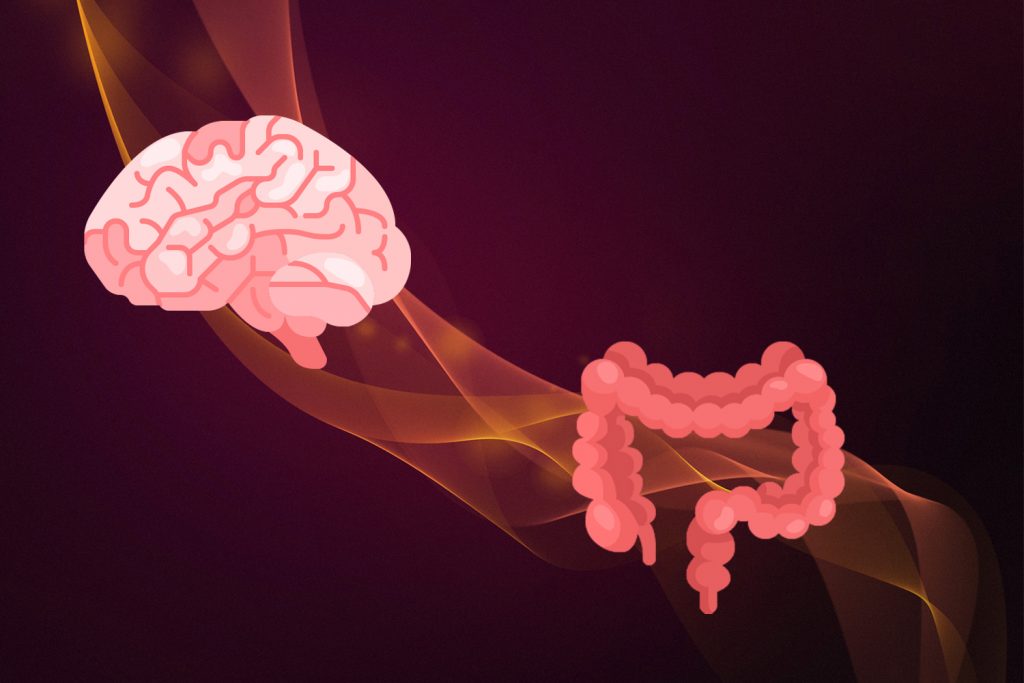09 Sep The gut-brain axis during heat stress

The gut-brain axis
The gut-brain axis is the two-way biochemical communication system that takes place between the digestive system and the central nervous system, that consists of the brain and the spinal cord. The gut-brain axis involves the gut microbiota, the immune system, the endocrine system, and nervous connections. Because the gut has the same type of neurons and neurotransmitters that are found in the brain, it is sometimes called “the second brain”.
The brain influences the gut through the vagus nerve, one the biggest nerves connecting the brain and the digestive system. Impaired function of the vagus nerve is related with digestive diseases. Neurotransmitters produced in the brain affect the functioning of the gut, for example some brain disorders reduce the secretion of bile acids.
On the other hand, research shows that the gut microbiome influences brain chemistry by releasing cytokines, neurotransmitters, neuropeptides and other messenger molecules, which arrive to the brain through the blood or the nerves. For example, the neurotransmitter serotonin, which modulates feeding, arousal, locomotion, flight and stress, is mostly produced by beneficial flora, and the toxins produced by some Clostridium species inhibit its activity.
The gut-brain axis during heat stress
Heat stress influences the gut-brain axis in direct and indirect ways:
- During heat stress, gut flora is altered and dysbiosis may occur
- The feed restriction practices that are used in our industry to fight heat stress may negatively impact the microbiome and increase the counts of species like Escherichia coli or Clostridium perfringens. Feed restriction is associated to a reduction in the production of short chain fatty acids, which are key for the general health of the animal and have beneficial effects on the liver and the brain.
- Beneficial gut flora, such as the genus Lactobacillus and Bifidobacterium, produces a neurotransmitter called gamma-aminobutyric acid (GABA), which can arrive to the brain, decrease body temperature and increase feed intake. As heat stress induces dysbiosis and reduces the count of beneficial species, the production of GABA in the gut is lowered.
- Heat stress activates the hypothalamic–pituitary–adrenal (HPA) axis: The HPA axis is a system of interaction between the hypothalamus, the pituitary gland (both located in the brain) and the adrenal glands (located in the kidneys). Its main function is the response to stress. When the HPA axis is stimulated by a stressor, such as high environmental temperatures, it starts a metabolic reaction that leads to the production of cortisol. Cortisol helps the body to deal with stress, by raising blood pressure, increasing circulating levels of glucose and by inhibiting processes that are deemed to be of lesser importance during stress, such as the reproductive function. Cortisol inhibits the gut immune system, leads to intestinal inflammation, impairs the gut barrier and reduces the secretion of neurotransmitters like serotonin by the microbiome.
- The activation of the HPA axis also stimulates the secretion of certain peptides that decrease appetite.
Use of plant extracts during heat stress
Thanks to their multifunctional mechanism of action, phytogenics are very effective to fight heat stress:
- By combining prebiotic and bactericide plant extracts, it is possible to restore the normal balance of gut flora
- Phytogenic have anti-inflammatory, antioxidant and immune boosting properties, and are able to reinstate the gut barrier
- Certain essential oils are able to increase feed intake by 10%
Products of choice
GrowthPlus© is added to feed to maintain and improve digestive health. It is formulated with synergistic ingredients:
- Bactericidal and fungicidal plant extracts, combined with organic acids for better effectiveness, that reduce the number of pathogenic microbes in the digestive system.
- Plant extracts with prebiotic effect, that promote the growth of beneficial bacteria in the gut.
- Immunostimulant and antioxidant plant extracts.
- Silicates with mycotoxin binding function.
It is especially useful in cases of gizzard diseases, necrotic enteritis, feed passage and other enteritis. It is also used as a natural growth promoter and to replace antibiotic growth promoters.
PlusProtect Digestive© is intended for digestive health in birds and rabbits of all ages. It is formulated with synergistic ingredients:
- Essential oils with bactericidal and fungicidal activity
- Plant extracts with prebiotic effect.
- Immunostimulant and antioxidant essential oils
PlusProtect Digestive© is useful to improve gut health in the following cases:
- Candidiasis in beak, crop and gizzard
- Bacterial infections in gizzard. In severe cases, it is better to give together with our PlusBind© line (mycotoxin binders)
- Bacterial infections in the intestines (necrotic enteritis; E.coli; Salmonella sp.)
- General digestive imbalances, such as feed passage.
DigestoCid© is indicated as an acidifier, sanitizer of drinking water and to improve intestinal health in poultry and pigs of all ages. It contains:
- Buffered organic acids, which reduce the pH of the water and inhibit the growth of Gram-negative bacteria.
- Monoester fatty acids, also called medium chain fatty acids, which inhibit the growth of Gram-negative and Gram-positive bacteria. In addition, they have antiviral effects.
- Essential oils and phytochemicals with antibacterial, antifungal, antiviral and antioxidant properties.
PlusBreathe© contains essential oils with natural antiseptic, antioxidant, expectorant and mucolytic activity. It has a refreshing taste.
It is indicated to improve the functioning of the respiratory system and to mitigate heat stress in birds, ruminants, pigs and rabbits of all ages. It can also be nebulized in the farm environment.
Do not miss any of our articles!
Subscribe to our monthly newsletter

Certain health statements may not be applicable in your region.

